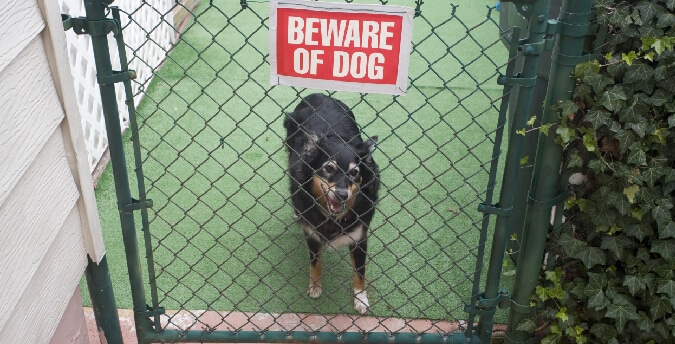How to Keep Your Dog From Biting

While having a dog can be wildly rewarding, the stress and anxiety of having a pet that bites can be a real obstacle; after all, as a pet owner, you’re responsible when your dog bites someone! But there are tips and strategies you can use today to help minimize the behavior.
UNDERSTAND YOUR DOG
Before going any further, it’s really important for a pet owner to understand that dogs bite because it’s instinctual; however, dogs may be more likely to bite when feeling like they’re under attack. They want to protect themselves, their puppies, or perhaps even you or your children. Dogs can react to just about any disruptive stimulus with a bite, from shock to fear or surprise. It could also be a warning to stay away from when an animal is feeling fatigued, sick, or injured, but they can learn different behavior. Simply running away makes the dog think you’re playing a game or spark predator/herder instinct, depending on the breed/socialization. Engaging with the dog to teach him corrective behavior can generate long-term positive results.
TRAINING IS CRITICAL
Understand the difference between mouthing and biting. Puppies who didn’t receive proper or sufficient socialization regarding mouthing and biting may need extra help in distinguishing between the two. Mouthing generally has a slower motion than biting, and is more relaxed, with not as much baring of teeth.
Hone your observation skills, as dogs rarely just bite someone out of the blue for no obvious reason. Get good at reading the warning signs that your dog is giving out. Look at your dog’s body language to see if he’s relaxed or tense.
Socialize your dog with other animals and people. Make sure your pet gets a wide variety of experiences so he becomes accustomed to occasional yet ordinary noises, like car backfires, kids, playing and shouting, traffic, or whatever else might make your dog feel scared. If you’ve completed any kind of training with your dog, maintain it to retain what you’ve both learned. If needed, don’t hesitate to seek professional help from a certified animal behaviorist or professional dog trainer. When hiring one, ask about their credentials, hands-on experience, and references, and then check those references.
PUPPIES
Puppies often mouth while playing, but that mouthing can escalate pretty easily. They can bite when they’re teething, tired, or just get too rambunctious in play. When it happens, it’s important to be clear and consistent that all fun stops immediately – no sounds, no eye contact, no petting, nothing. Pretend you’ve gone invisible for five seconds. The second time it happens, remove yourself from the space for five seconds. The third time, crate the dog and leave the room in silence, making this a real time out (but do make sure there’s a toy already in the crate). Your reaction to the biting may need to be repeated a few times before the pup seems to get it.
ADULT DOGS
Most dogs learn about bite inhibition as puppies, through ordinary roughhousing with other dogs. Two dogs go at it, one goes too far and gets a reaction and they both learn from it. Ideally, that lesson carries over into the dog’s interactions with other dogs and people, too. If you behave similarly to how another dog would have behaved during rough play in puppyhood, you can still teach that lesson to your adult dog today.
If the dog bites you while playing, give a little yell to show your reaction; alternatively, give a firm verbal warning, and praise him when he stops. If the behavior continues, try a time-out. When bitten, give a little yell so there’s an audible clue that he’s overstepped, and ignore the dog for a short period, like 20 seconds. If necessary, remove yourself from the room if the behavior repeats. As time goes on and this process repeats, lower your tolerance to bites so your dog learns that he needs to go easier.
Other alternatives include cutting down on the mouthing in general by swapping out your hand for a toy, and avoiding intense contact play, especially avoiding putting your hands close to the dog’s mouth and face; instead, use fetch or tug of war. Work on your pet’s self-control skills like sitting or staying, and encourage greater social interaction with other dogs (safely). Finally, some pet owners do have success using taste deterrents.
FINAL TIPS
Always focus on positive reinforcement over negative reinforcement when trying to change your pet’s behavior. Use treats and rewards instead of physical punishment. Shock collars and similar tools are generally to be avoided unless absolutely necessary, and use common sense. Finally, advise others to be cautious around your dog until you get the biting under control. It may take some time, but it is possible to change your pet’s behavior to reduce biting.
